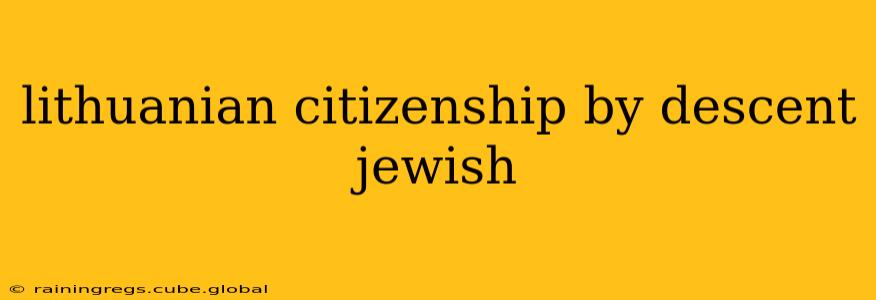Obtaining Lithuanian citizenship by descent can be a complex process, particularly for those tracing their Jewish heritage. This guide aims to clarify the requirements and procedures, addressing common questions and concerns faced by individuals of Jewish descent seeking Lithuanian nationality. While the process is similar to that for other descendants of Lithuanian citizens, the unique challenges related to documenting Jewish ancestry warrant specific attention.
What are the requirements for Lithuanian citizenship by descent?
Lithuanian citizenship by descent is granted to individuals who can prove their direct lineage to a Lithuanian citizen who lost their citizenship due to events such as Soviet occupation or annexation. This means tracing your ancestry back to a Lithuanian citizen who had their citizenship revoked or who was a Lithuanian citizen before the loss of Lithuanian independence in 1940. Crucially, you must demonstrate uninterrupted descent from this ancestor. This usually requires proving a continuous family line, documented through birth certificates, marriage certificates, and other relevant historical records. The specific documentation required can vary based on the historical context and the availability of records.
How can I prove my Jewish ancestry for Lithuanian citizenship?
Proving Jewish ancestry is a crucial step for many applicants, as it often involves navigating historical records that may be incomplete or difficult to access. Evidence such as birth certificates, marriage certificates, and religious records (e.g., records from synagogues or community organizations) are vital. However, these records might be fragmented, lost, or written in different languages. Translation and verification of these documents will be necessary. It's also important to note that Lithuanian authorities will scrutinize the documentation to ensure its authenticity and relevance to the citizenship claim.
What if my ancestral records are incomplete or unavailable?
This is a common challenge faced by many individuals seeking citizenship by descent. If certain records are missing or unavailable, you might need to gather alternative evidence, such as testimonies from family members, genealogical research, or historical accounts. Consultations with genealogy professionals specializing in Lithuanian Jewish history can significantly improve your chances of building a solid case. Remember, meticulous research and a well-documented application significantly enhance the likelihood of success.
What documents are needed for a Lithuanian citizenship application by descent?
While the precise documentation requirements may change, generally expect to provide certified copies of birth certificates, marriage certificates, and death certificates for each generation connecting you to your Lithuanian ancestor. You will also likely need to provide proof of your current identity (passport or national ID), proof of residence, and a completed application form. Again, meticulously translated and verified records from all relevant periods are paramount.
How long does the Lithuanian citizenship by descent process take?
The processing time for Lithuanian citizenship applications can vary significantly depending on various factors, including the completeness of your application, the complexity of your ancestral lineage, and the current workload of the Lithuanian authorities. While some applications may be processed relatively quickly, others can take several months or even years. Patience and consistent follow-up are essential throughout the process.
What are the costs associated with applying for Lithuanian citizenship by descent?
There are associated fees with the application process, including administrative fees payable to the Lithuanian authorities. Additionally, you should budget for costs related to document retrieval, translation, and potentially legal representation. It's advisable to obtain updated information on the current fee structure directly from the Lithuanian authorities or a qualified immigration lawyer specializing in Lithuanian citizenship matters.
This guide provides a general overview and should not substitute for legal advice. Consulting with an immigration lawyer specializing in Lithuanian citizenship matters is strongly recommended for personalized guidance and to ensure your application is complete and compliant with all current regulations. They can provide crucial assistance in navigating the complex requirements and processes involved in obtaining Lithuanian citizenship by descent, particularly when dealing with the challenges of documenting Jewish ancestry.
